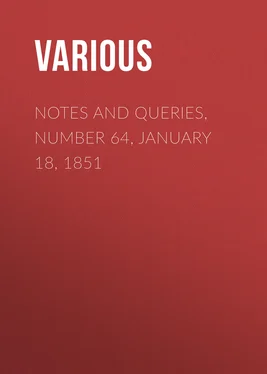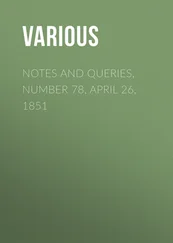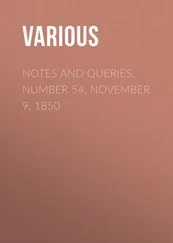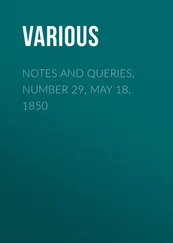Various - Notes and Queries, Number 64, January 18, 1851
Здесь есть возможность читать онлайн «Various - Notes and Queries, Number 64, January 18, 1851» — ознакомительный отрывок электронной книги совершенно бесплатно, а после прочтения отрывка купить полную версию. В некоторых случаях можно слушать аудио, скачать через торрент в формате fb2 и присутствует краткое содержание. Жанр: foreign_antique, periodic, foreign_edu, на английском языке. Описание произведения, (предисловие) а так же отзывы посетителей доступны на портале библиотеки ЛибКат.
- Название:Notes and Queries, Number 64, January 18, 1851
- Автор:
- Жанр:
- Год:неизвестен
- ISBN:нет данных
- Рейтинг книги:3 / 5. Голосов: 1
-
Избранное:Добавить в избранное
- Отзывы:
-
Ваша оценка:
- 60
- 1
- 2
- 3
- 4
- 5
Notes and Queries, Number 64, January 18, 1851: краткое содержание, описание и аннотация
Предлагаем к чтению аннотацию, описание, краткое содержание или предисловие (зависит от того, что написал сам автор книги «Notes and Queries, Number 64, January 18, 1851»). Если вы не нашли необходимую информацию о книге — напишите в комментариях, мы постараемся отыскать её.
Notes and Queries, Number 64, January 18, 1851 — читать онлайн ознакомительный отрывок
Ниже представлен текст книги, разбитый по страницам. Система сохранения места последней прочитанной страницы, позволяет с удобством читать онлайн бесплатно книгу «Notes and Queries, Number 64, January 18, 1851», без необходимости каждый раз заново искать на чём Вы остановились. Поставьте закладку, и сможете в любой момент перейти на страницу, на которой закончили чтение.
Интервал:
Закладка:
Various
Notes and Queries, Number 64, January 18, 1851
NOTES
AUTHORSHIP OF HENRY VIII
In my last communication on the subject of Henry VIII. , I referred to certain characteristic tricks of Fletcher's style of frequent occurrence in that play, and I now beg leave to furnish you with a few instances. I wish it, however, to be understood, that I advance these merely as illustrative specimens selected at random; as there is scarcely a line of the portions of the play I assume to be Fletcher's but would furnish some evidence to a diligent student of this writer's style: and that, although I think each separate instance as strongly characteristic of Fletcher as it is unlike Shakspeare, it is only in their aggregate number that I insist upon their importance.
The first instance to which I call attention is the use of the substantive "one" in a manner which, though not very uncommon, is used by no writer so frequently as Fletcher. Take the following:—
" So great ones."— Woman's Prize , II. 2.
"And yet his songs are sad ones."— Two Noble Kinsmen , II. 4.
and the title of the play, The False One .
Compare with these from Henry VIII. :—
"This night he make a supper, and a great one."—Act I. 3.
"Shrewd ones."—"Lame ones."—" so great ones."— Ibid.
"I had my trial,
And must needs say a noble one."—Act II. 1.
"A wife—a true one."—Act III. 1.
"They are a sweet society of fair ones."—Act I. 4.
Fletcher habitually uses "thousand" without the indefinite article, as in the following instances:
"Carried before 'em thousand desolations."— False One , II. 9.
"Offers herself in thousand safeties to you."— Rollo , II. 1.
"This sword shall cut thee into thousand pieces."— Knight of Malta , IV. 2.
In Henry VIII. we have in the prologue:
"Of thousand friends."
"Cast thousand beams upon me."—Act IV. 2.
The use of the word "else" is peculiar in its position in Fletcher:—
"'Twere fit I were hang'd else."— Rule a Wife , II.
"I were to blame else."— Ibid.
"I've lost me end else."—Act IV.
"I am wide else."— Pilgrim , IV. 1.
In Henry VIII. , the word occurs in precisely the same position:—
"Pray God he do! He'll never know himself, else."—Act II. 2.
"I were malicious, else."—Act IV. 2.
The peculiarly idiomatic expression "I take it" is of frequent occurrence in Fletcher, as witness the following:—
"This is no lining for a trench, I take it."— Rule a Wife , III.
"And you have land i' th' Indies, as I take it."— Ibid. IV.
"A fault without forgiveness, as I take it."— Pilgrim , IV. 1.
"In noble emulation (so I take it)."— Ibid. IV. 2.
In one scene of Henry VIII. , Act I. 3., the expression occurs twice: "One would take it;" "There, I take it."
Of a peculiar manner of introducing a negative condition, one instance from Fletcher, and one from Henry VIII. in reference to the same substantive, though used in different senses, will suffice:
"All noble battles,
Maintain'd in thirst of honour, not of blood."— Bonduca , V. 1.
"And those about her
From her shall read the perfect ways of honour,
And by those claim their greatness, not by blood."— Henry VIII. , V. 4.
Of a kind of parenthetical asseveration, a single instance, also, from each will suffice:
"My innocent life (I dare maintain it, Sir)."— Wife for a Month, IV. 1.
"A woman (I dare say, without vain glory)
Never yet branded with suspicion."— Henry VIII., III. 1.
"A great patience," in Henry VIII. , may be paralleled by "a brave patience," in The Two Noble Kinsmen : and the expression "aim at," occurring at the close of the verse (as, by the bye, almost all Fletcher's peculiarities do) as seen in Act III. 1.,
"Madam, you wander from the good we aim at,"
is so frequently to be met with in Fletcher, that, having noted four instances in the Pilgrim , three in the Custom of the Country , and four in the Elder Brother , I thought I had found more than enough.
Now, Sir, on reading Henry VIII. , and meeting with each of these instances, I felt that I remembered "the trick of that voice;" and, without having at present by me any means for reference, I feel confident that of the commonest examples not so many can be found among all the rest of the reputed plays of Shakspeare, as in Henry VIII. alone, or rather in those parts of Henry VIII. which I reject as Shakspeare's; while of the more remarkable, I think I might challenge the production of a single instance.
My original intention in the present paper was merely to call attention to a few such expressions as the foregoing; but I cannot resist the impulse to quote one or two parallels of a different character:—
Henry VIII. :
"The dews of heaven fall thick in blessings on her!"—Act IV. 2.
Fletcher:
"The dew of sleep fall gently on you, sweet one!"— Elder Brother , IV. 3.
"Blessings from heaven in thousand showers fall on ye!"— Rollo , II. 3.
"And all the plagues they can inflict, I wish it,
Fall thick upon me!"— Knight of Malta , III. 2.
Henry VIII. :
"To-day he puts forth
The tender leaves of hope, to-morrow blossoms."—Act III. 2.
Fletcher:
"My long-since-blasted hopes shoot out in blossoms."— Rollo , II. 3.
These instances, of course, prove nothing; yet they are worth the noting. If, however, I were called upon to produce two passages from the whole of Fletcher's writings most strikingly characteristic of his style, and not more in expression than in thought, I should fix upon the third scene of the first act of Henry VIII. , and the soliloquy of Wolsey, Beginning—
"Farewell, a long farewell to all my greatness!"
In conclusion, allow me to remark, that I am quite content to have been anticipated by MR. SPEDDING in this discovery (if discovery you and your readers will allow it to be), for the satisfaction I am thereby assured of in the concurrence of so acute a critic as himself, and of a poet so true as the poet-laureate.
SAMUEL HICKSON.Dec. 10. 1850.
THE CAVALIER'S FAREWELL
The following song is extracted from the MS. Diary of the Rev. John Adamson (afterwards Rector of Burton Coggles, Lincolnshire) commencing in 1658. Can any of your readers point out who was the author?—
1.
"Ffair Ffidelia tempt no more,
I may no more thy deity adore
Nor offer to thy shrine,
I serve one more divine
And farr more great y{^n} you:
I must goe,
Lest the foe
Gaine the cause and win the day.
Let's march bravely on
Charge y min the Van
Our Cause God's is,
Though their odds is
Ten to one.
2.
"Tempt no more, I may not yeeld
Although thine eyes
A Kingdome may surprize:
Leave off thy wanton toiles
The high borne Prince of Wales
Is mounted in the field,
Where the Royall Gentry flocke.
Though alone
Nobly borne
Of a ne're decaying Stocke,
Cavaleers be bold
Bravely hold your hold,
He that loyters
Is by Trayto rs
Bought and sold.
Интервал:
Закладка:
Похожие книги на «Notes and Queries, Number 64, January 18, 1851»
Представляем Вашему вниманию похожие книги на «Notes and Queries, Number 64, January 18, 1851» списком для выбора. Мы отобрали схожую по названию и смыслу литературу в надежде предоставить читателям больше вариантов отыскать новые, интересные, ещё непрочитанные произведения.
Обсуждение, отзывы о книге «Notes and Queries, Number 64, January 18, 1851» и просто собственные мнения читателей. Оставьте ваши комментарии, напишите, что Вы думаете о произведении, его смысле или главных героях. Укажите что конкретно понравилось, а что нет, и почему Вы так считаете.












